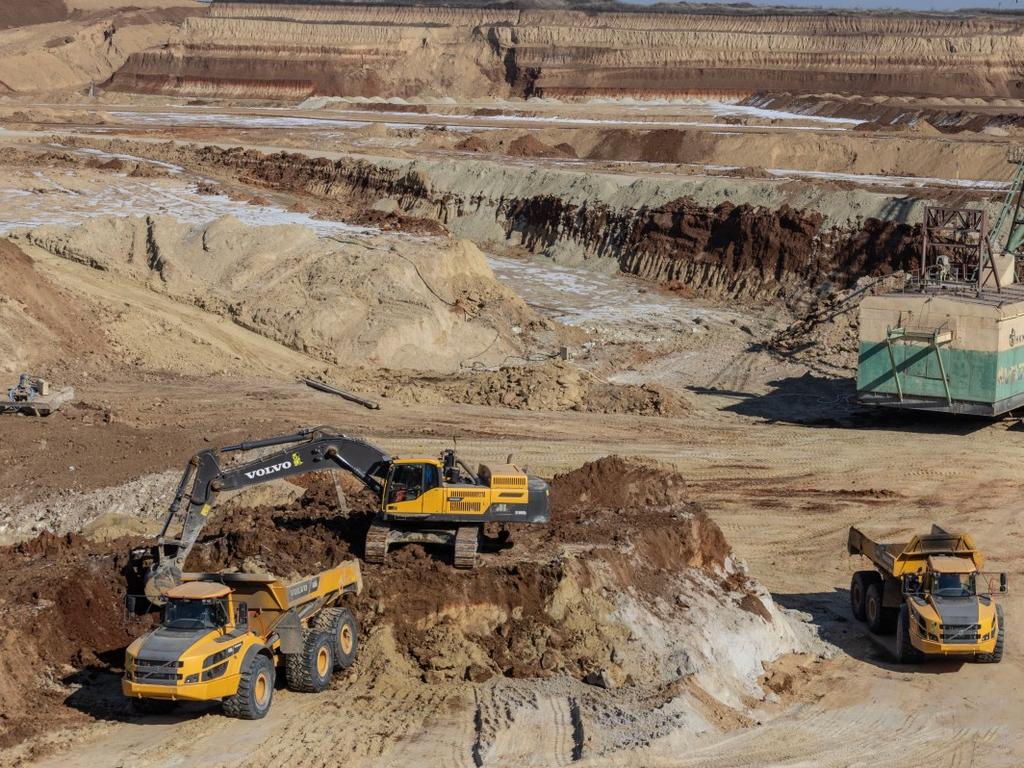Ukraine, US sign ‘historic’ economic deal for rare minerals
Kyiv and the US have signed the deal to allow Washington access to Ukraine’s minerals, after the Trump administration dropped its insistence the agreement allow it to recoup billions of dollars.

The US and Ukraine have signed a deal for access to Ukrainian mineral wealth, overcoming last-minute haggling that had held up the agreement.
Treasury Secretary Scott Bessent hailed the deal as a step toward a negotiated end to the war in Ukraine and a beginning of the country’s reconstruction. In tightly controlled negotiations, the Trump administration dropped its insistence that the agreement allow Washington to recoup billions of dollars of past military aid.
“As the President has said, the United States is committed to helping facilitate the end of this cruel and senseless war,” Bessent said in a press release. “This agreement signals clearly to Russia that the Trump Administration is committed to a peace process centered on a free, sovereign, and prosperous Ukraine over the long term.”
In Kyiv, Prime Minister Denys Shmygal said on national television the agreement was “good, equal and beneficial.”
In a post on Telegram, Mr Shmygal said the two countries would establish a Reconstruction Investment Fund with each side having 50 percent voting rights.
“Ukraine retains full control over its subsoil, infrastructure and natural resources,” he said.
The completion of the minerals deal marks a high point for relations between Kyiv and Washington which have soured in recent months, not least over the deal for Ukraine’s minerals.
A one-to-one meeting between Trump and Zelensky at the Vatican over the weekend ahead of Pope Francis’ funeral appears to have eased tensions between the two leaders, with both describing the encounter as productive.
An agreement also provides a morale boost for Ukraine as its people face daily bombardment from Russia, which has killed and wounded dozens of civilians across the country in recent weeks as negotiations for a cease-fire continue without success.
The deal is also envisaged by the White House as a kind of security guarantee for Ukraine in the event a ceasefire is reached with Russia. Trump officials argue that US business presence in Ukraine would deter Moscow from attacking the country again.

The fund will invest into Ukraine for a period of 10 years, focusing on rebuilding Ukraine and renewing the country’s economy. Ukraine will retain control over its minerals, paying into the fund with new licenses it issues. The deal will also be tax and tariff-free for both countries, Shmyhal said.
Zelensky initially proposed a mineral deal in the summer of 2024, before Trump’s election, in a bid to woo Republican support. Ukraine has reserves of lithium, titanium and other rare-earth metals essential for everything from cellphones to the defense industry.
Kyiv saw the initial agreement presented by Bessent during a trip to Ukraine as a starting point for negotiations, while Washington hoped for the document to be signed on the spot.
Zelensky’s refusal to sign a deal that his administration had only a few hours to study sparked a war of words between the two leaders, culminating in the White House blow-up between the Ukrainian president, Trump and Vice President JD Vance.
A critical disagreement was whether Ukraine was responsible for repaying costs of past assistance provided underusr the Biden administration. Trump, putting the cost of the aid at $350 billion, said Ukraine must pay. Zelensky, who put the price tag at $100 billion, said it was a red line because the military assistance came in the form of grants.

Yet even as diplomatic relations between Kyiv and Washington crumbled, hope for reviving the deal endured.
When the Trump administration sent another, different, proposal in late March, it spelled out sweeping demands Ukraine couldn’t accept. That version of the agreement put repayment of debt back on the table and asked for broad control over the country’s economy, conflicting with Ukraine’s obligations to the European Union, the World Bank and the International Monetary Fund.
Rather than balk at the March proposal, Ukrainians continued negotiating. Weeks later, a memorandum of understanding was signed virtually by Bessent and Svyrydenko, who had been instrumental in the negotiations.
The memorandum spelled out a path toward a more-comprehensive agreement that would establish a fund for the reconstruction and economic investment of Ukraine.
The latest draft explicitly respects Ukraine’s international obligations, Shmyhal said.
Wall Street Journal





To join the conversation, please log in. Don't have an account? Register
Join the conversation, you are commenting as Logout